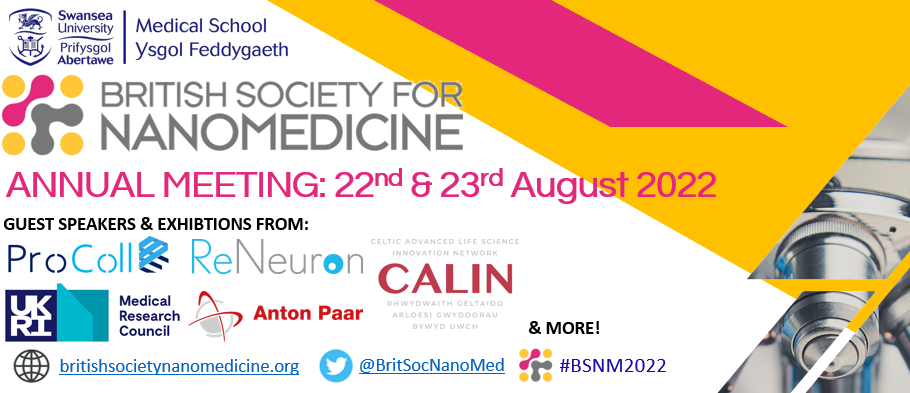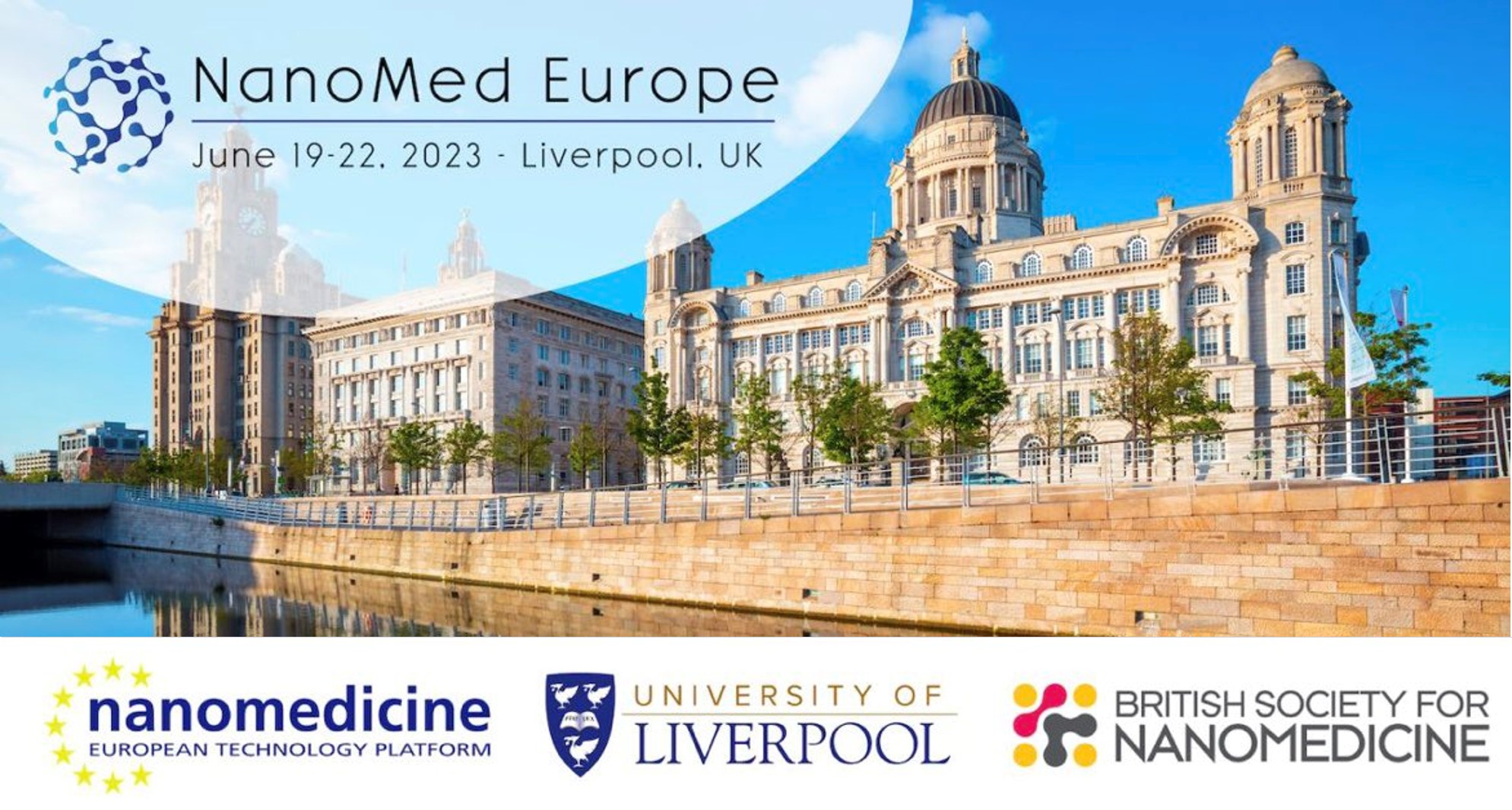Nanomed Europe 2023
The British Society for Nanomedicine (BSNM) are proud to have been a part of the Nanomed Europe 2023 Conference with European Technology Platform for Nanomedicine and University of Liverpool. This event built on the successes of our previous meetings and will took place in Liverpool on the 19th & 22nd June 2023.
For the full overview and conference details, please go to: http://www.nme23.eu

BSNM Annual Meeting
The British Society for Nanomedicine (BSNM) Annual Meeting 2022 took place in Swansea University, on the 22nd & 23rdAugust 2022. It provided an excellent opportunity for researchers to showcase innovative research and discuss outputs and opportunities with both senior and young researchers and experts within the field of nanomedicine.
BSNM Annual Meeting 2022: Programme
Session 1: Nanoparticles for Cancer Therapy
SESSION LEAD: Dr Lewis Francis (Swansea University) – Precision medicine technology informed future therapies for ovarian cancer
Khadeejah Maeyouf (Strathclyde University) – Synthesis, characterization and in vitro evaluation of a novel tumour-targeted zein-based delivery system for prostate cancer therapy
Ubah Abdi (Queens’s University Belfast) – Targeting the pancreatic tumour microenvironment using B7-H3 targeted vismodegib-poly(lactic-
Robert Cavanagh (University of Nottingham) – Prodrug nanoparticle loaded supramolecular hydrogels for drug delivery to glioblastoma
Session 2: Nano-Biological Interactions I
SESSION LEAD: Professor Arwyn Jones (Cardiff University) – Endocytic Profiling for Analysing the Cellular Uptake, Intracellular Trafficking and Delivery Capacity of Nanomedicines
Joe Fox (University of Leeds) – Synthesis of Novel Gold Nanoparticle Morphologies for Applications in a Cancer Biomarker Lateral Flow Assay
Rafal Baker (King’s College London) – Nose-to-brain Delivery of Riluzole-loaded Polymeric Nanoparticles for The Treatment of Amyotrophic Lateral Sclerosis
Rahul Shukla (National Institute of Pharmaceutical Education and Research) – Development and evaluation of Silibinin loaded Glyceryl monooleate Nano liquid crystalline for Alzheimer’s therapy.
Session 3: Nano-Biological Interactions II
SESSION LEAD: Dr Paul Hole (ReNeuron) – Extracellular vesicles: Delivering on the promises of next-gen therapeutics
Kirsty Meldrum (Swansea University) – An in vitro approach towards elucidating the safety of nanomaterials
Medina Guliyeva (University College London) – The role of Apolipoproteins in protein corona formation and cellular uptake of gold nanoparticles
Sarwar Beg (University of Central Lancashire) – Co-delivery of temozolomide and γ-linolenic acid via nanostructured lipid carriers for treatment of glioblastoma multiforme
Session 4: Novel Nanomaterials
SESSION LEAD: Dr Elaine Ferguson (Cardiff University) – Dextrin-colistin conjugates designed to ameliorate acute kidney injury
Kadie Edwards (Swansea University) – Advanced in vitro selection processes define drug delivery strategies in solid tumour cancers
Pratik Gurnani (University of Nottingham) – Self-amplifying RNA delivery using charge reversal polymers
Weiqi Zhang (King’s College London) – Characterising chemical and physical properties of phase-change nanodroplets.
Session 5: Nanoparticles for Drug Delivery
SESSION LEAD: Professor Andrew Owen (University of Liverpool) – Long-acting drug delivery for anti-infective agents
Hawraa Ali-Jerman (Strathclyde Uni) – Design of stealth nanoparticles for DNA delivery to cancer cells
Nurcan Gumus (University of Nottingham) – siRNA therapeutic agent delivery via synthetic polycations in glioblastoma
Session 6: Nanoparticle Fabrication
SESSION LEAD: Beth Hinchliffe (National Physical Laboratory) – Deagglomeration of DNA nanomedicine carriers using controlled ultrasonication
Naveed Ahmad (King’s College London) – Exploiting design of experiment for the development of polymeric nanoparticles for intranasal delivery of oxytocin to treat neurodevelopmental disorders
Chantelle Spiteri (Kings College London) – mRNA delivery by laser-induced poration using porous silicon nanoparticles
Cameron Hogarth (University of Liverpool) – Evaluating the impact of systematic hydrophobic modification of model drugs on the control, stability and loading of lipid-based nanoparticles
Session 7: Innovative Microbial Applications for Nanomaterials
SESSION LEAD: Professor Kamalinder Singh (University of Central Lancashire) – Targeted lung delivery of antifungal drug with nebulised surface-active hybrid nanoparticles for treatment of pulmonary aspergillosis
Ioanna Mela (University of Cambridge) – DNA nanostructures as a tool for targeted antimicrobial delivery






















